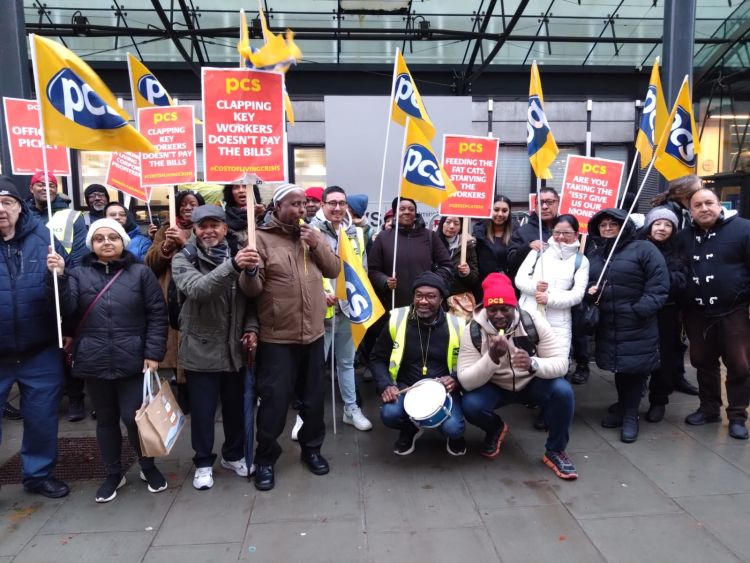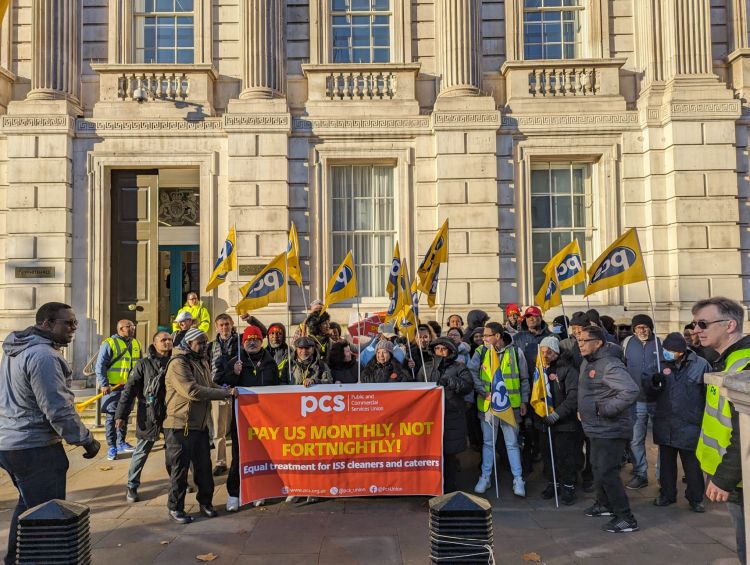“Don’t be afraid to be bold”: Winning for outsourced workers at ISS
After nearly 7 weeks of strike action, PCS members agreed a deal that saw their pay rise above the Living Wage Foundation’s rates – and secured them further gains on full pay sick absence and other vital terms, closing the gap between them and the civil service.
PCS rep Duncan Gallon talked to the TUC about the recent dispute.
A paltry pay offer
Duncan said: “We’ve been in dispute with ISS over pay every year for the last 4 years, since they took on the outsourcing contract on behalf of the Government Property Agency.
Going into this year’s pay claim we were clear we wanted a commitment to better terms and conditions, a decent pay rise, and union recognition.
Instead, we were offered a paltry 2%.
At the time, inflation was running at 7.1% so this was a huge real-terms pay cut, and nowhere near good enough. We negotiated to try and improve this offer – but ISS wouldn’t budge or seriously enter talks.
In May, we had no choice but to ballot our members for industrial action.”
Vote for strike action
Duncan continued: “The ballot vote came back as a solid yes with 98.5% in favour of taking action. And workers from the Department for Energy Security and Net Zero, the Department for Business and Trade, and the Department for Science, Innovation and Technology took 10 days of well-supported strike action in September and October.
The picket lines were positive and boisterous – and were well attended with dozens of members attending every day to keep up the pressure on ISS.
The lively picket lines attracted support from MPs, the TUC, nearby civil servants and many passersby.”
But unfortunately, the action wasn’t enough to encourage ISS to continue negotiations and there was no improvement on the original 2% offer. It was time to up the ante.

Third stage of action
Duncan said: “We went into a third stage of action. The cleaners, security guards and support staff decided to take strike action for 36 days, from 1-17 November and from 27 November to 15 December.
Once again dozens of members gathered on Victoria Street or Whitehall Place, waving PCS flags, carrying placards, blowing horns, leafleting members of the public, and dancing to music that was blasting out from a speaker.
The group was also visited by TUC General Secretary Paul Nowak and PCS Parliamentary Group chair, MP Chris Stephens.”
Attending the picket line, Paul Nowak noted that in the many public and private sector disputes he has seen over the past 12 months, the employer had “started off by saying we cannot afford anymore and we’re not going to negotiate”.
“But in dispute after dispute, workers have won decent pay rises,” he said.
So I think the message to ISS today is that if you have £72 million in profits – and you can hand out £1million in bonuses to your senior staff – then you can pay your staff fairly and deliver a decent pay rise.
Winning for workers
Duncan continued: “ISS finally agreed to get back round the table and we had some fairly intensive negotiations – but these resulted in a significantly better offer than before.
In December 3 in 5 of our members (60%) members voted to accept the deal.
The deal was backdated to 1 March 2023. The key wins were consolidated pay rises of at least 5%, with most getting between 5-8%, and some more. This put all our members at ISS above the London Living Wage.
We also won 5 more days of full sick pay, 20 days of 'disability leave’ (a new entitlement), and harmonisation of all 'family-friendly' leave with the Civil Service. That includes maternity and adoption leave.
It’s only right that outsourced workers should be on the same terms as those employed directly by the Civil Service – otherwise you end up with an unfair two-tier system.
And crucially, while we are still chasing union recognition, our members can now get paid time off to do trade union duties. This enables staff to take part directly in key discussions and negotiations.”

The key advice is – be bold!
Duncan, who has been a union rep for around 30 years, said his key advice for other reps is to “be bold”.
He told the TUC: “Don’t be afraid to be bold! When we started off negotiations with ISS in 2019 we had about a dozen members. But within weeks we had over 100 members.
We managed to maintain that level because we convinced our members that by standing together, we could win – and we have.
In fact, we are yet to lose. The successive wins we’ve had have given people the confidence to speak to the union – whereas before, they might just have accepted poor terms and conditions and thought there was nothing they could do to challenge that.
We worked out where our leverage is, and we’ve applied pressure accordingly. We’ve won significant gains, and we will continue to go from strength to strength.”

